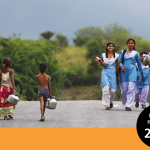
Going Nowhere on Human Development
6 October 2009
The latest Human Development Report released yesterday (5th October 2009) is depressing for every Indian. The Report ranks countries – 180 in total – in terms of three basic indicators of human development: per capita GDP (adjusted for purchasing power of the local currency), literacy rate and life expectancy at birth. They are meant to capture at an aggregate level the well-being of people in a particular country in terms of income, education and health. India ranks 134, below Bhutan and Laos, and just above Solomon Islands and Congo. This should be reason enough for the nation as a whole, and especially the politicians, bureaucrats and policy makers, to hang their heads in shame.
The usual practice of the apologists is to say that the rankings themselves are unfair – that the HDR does not take into account factors such as democracy, freedom of press, rule of law and other aspects of governance that India prides itself with. But the fact of the matter is that there has been no change in our HDI rank since last year, and a decline in the rank from the beginning of this decade. So, while in absolute terms the HDI index has increased by a few percentage points, our relative performance compared to other countries has become worse. At the same time, China’s HDI rank has gone up seven places in just one year – from 99 in 2006 to 92 in the latest one.
The data also shows that India’s GDP per capita rank is in fact higher than the combined HDI rank – 128 as compared to 134. This is even more worrying because the usual excuse of linking low human development and poverty does not strictly hold. The comparative figure for Sri Lanka is 14 and China 10, indicating that these countries did better at education and health than their comparative per capita GDP ranking suggests.
It is time to ask the hard questions: why is India going nowhere in human development in spite of large allocations to education, health and livelihood security? Why are flagship programs like SSA, NRHM and NREGA not delivering improvements in our comparative performance vis-à-vis other (supposedly much poorer) countries of the world? Why is there no revulsion at the complete impunity and lack of accountability of the political and administrative machinery using tax payers’ money for noble purposes such as education and health? What does it mean for our long-term standing in the world community? In short, who is (are) accountable for this dismal state of affairs and what is being done to fix this?
P.S. India’s HDI rank is common both in G20 and BRICs group of nations – LAST!!
Dr. Anit Mukherjee is a Fellow at National Institute of Public Finance and Policy, New Delhi





